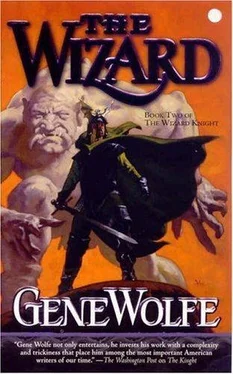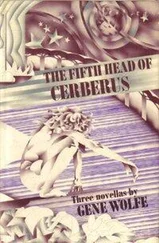Gene Wolfe - The Wizard
Здесь есть возможность читать онлайн «Gene Wolfe - The Wizard» весь текст электронной книги совершенно бесплатно (целиком полную версию без сокращений). В некоторых случаях можно слушать аудио, скачать через торрент в формате fb2 и присутствует краткое содержание. Год выпуска: 2006, ISBN: 2006, Жанр: Фэнтези, на английском языке. Описание произведения, (предисловие) а так же отзывы посетителей доступны на портале библиотеки ЛибКат.
- Название:The Wizard
- Автор:
- Жанр:
- Год:2006
- ISBN:9780765312013
- Рейтинг книги:3 / 5. Голосов: 1
-
Избранное:Добавить в избранное
- Отзывы:
-
Ваша оценка:
- 60
- 1
- 2
- 3
- 4
- 5
The Wizard: краткое содержание, описание и аннотация
Предлагаем к чтению аннотацию, описание, краткое содержание или предисловие (зависит от того, что написал сам автор книги «The Wizard»). Если вы не нашли необходимую информацию о книге — напишите в комментариях, мы постараемся отыскать её.
The Wizard — читать онлайн бесплатно полную книгу (весь текст) целиком
Ниже представлен текст книги, разбитый по страницам. Система сохранения места последней прочитанной страницы, позволяет с удобством читать онлайн бесплатно книгу «The Wizard», без необходимости каждый раз заново искать на чём Вы остановились. Поставьте закладку, и сможете в любой момент перейти на страницу, на которой закончили чтение.
Интервал:
Закладка:
Garvaon started to speak, but Beel motioned him to silence, saying, “How do you know, Berthold?”
“They’d of had me unload the mules, sir, and the pack horses. They never said nothing about it, only talked about killing me, and that’s when I snuck off and went looking for Sir Able, hoping he might be around yet.”
Beel looked at Toug, who shook his head.
“You’re a friend of his?”
“Aye! He was going to get us out, me and Gerda. It was him that killed Bymir. That’s Gerda come to stay with me, sir ’cause Sir Abie’s going to take us out when he’s back from the big castle up north. Only he ain’t come yet.”
“We’ve come,” Garvaon said somewhat self-consciously, “and that may be good enough.”
“I do hope, sir.”
A distant sentry shouted, and Garvaon muttered, “They’re going,” and was on horseback before Toug had time to ask what that might mean for them.
It had seemed best to wait until the Angrborn were clear of the farm, with its fences and pigsties. Then Garvaon ranged his riders in a broad crescent, strongest at its ends, that would envelop the Angrborn while leaving a slender and closing route of escape to the north. The objective (as he and Beel had explained at a length that Toug found wearying) was not so much to kill the Angrborn as to separate them from the pack animals. It was hoped the Angrborn would abandon their booty once they realized they were nearly surrounded. Svon was at the center of the crescent, with Toug on his left and Uns on his right. Privately Toug wondered whether Svon was capable of fighting; with a flash of insight he realized that Garvaon had put him there for his mail and helmet—that Garvaon hoped the giants would take him for a knight.
“Where’s Zir Abie’s dog, Doog?” Svon’s words were snatched away by a cutting wind. “We may need him.”
Although he agreed, Toug shrugged. “I don’t know.”
“Whis’le for him, can’d you?”
Toug whistled loud and long, without result.
Uns waved. “Wear da big house is, mebbe,’n da barn. I seen da lady’s cat. Mousin’ in da barn, I reckon.”
A trumpet sounded, and the crescent surged forward, some riding too fast, others too slowly. “Keep line! Keep line!” Svon shouted. Few obeyed—or even appeared to understand what he meant; he left his place, cantering up the crescent to restrain the impetuous and urge the laggards forward.
Their ragged advance seemed to take hours. Toug nerved himself for the fight a dozen times, his states of readiness never lasting for more than three of the white stallion’s strides. Then (and it was much too soon) the Angrborn came into view. The trumpet blew the charge. Toug leveled the lance he had made from my knife and a sapling, tucking its butt under his arm, and clapped his heels to the stallion.
The next three or four minutes were a pandemonium of dust, noise, and confusion he was never able to recall with clarity. A pack mule ended his charge, the stallion crashing into it so that both fell amid thrashing hooves and rattling goblets the size of soup tureens. While he was scrambling to his feet, a sword as long as a weaver’s beam flashed over his head, red already with someone’s blood.
He must have found his lance and caught the stallion, because he was mounted again, bruised and badly shaken.
The Angrborn roared, horses and mules shrieked, and men shouted, bellowed, and groaned. An Angrborn rose before him. Perhaps he rode toward it; perhaps he thrust at it with his rude lance; perhaps he fled. Perhaps all three. The image remained in his mind, bereft of fact.
Abruptly, there was a servingman in the saddle behind him. The reins were snatched from him, and they were riding away, streaming from the fight with twenty or thirty more; my knife was crooked on the end of Toug’s staff, crooked and dripping, a drop striking him in the face as he raised his staff and the stallion dropped to a weary trot.
He twisted and snatched the reins, wanting to say they were running but must not, that they had to fight again and win; but the servingman hit him on the ear, knocking him into a night in which there was no more fighting.
When he was able to stand, he saw scattered, frightened men with bows. There was no dooming cloud of arrows, nothing that would fit the descriptions of battles he had heard. An arrow flew now and then, as a lone bird flies at twilight, a faint singing in the empty air.
To the north, the lofty figures of Angrborn were making off through a field of millet, man-high millet that betrayed the presence of the animals they drove by frantic, irregular motion. An arrowhead of gray geese passed over animals and giants, three birds on one side of the leader and two on the other, creaking like rusty hinges as they rode a cruel wind. Their arrow seemed more warlike and more apt to be effective than those shot by the men with bows. The giant king was letting fly geese from the ramparts of his castle, Toug thought, a castle like the one he had seen when griffin fought dragon above the clouds, although doubtless larger.
Almost idly he looked farther, shading his eyes, to where two—no, four pinpricks of scarlet appeared along a range of brown hills. Darker against the darkling sky, a mounted man bent as if plucking something from the grass. He straightened, and held a light smaller than the blossoming scarlet that made his mount sidle away. Rising in the saddle—an act scarcely discernible at such a distance—he cast the lesser light west, a spark arcing high against the cloud banks.
A moment later, he wheeled his mount south, toward Toug. Driven by the wind, the crimson lights raced as fast as he; a breath, another, and the pungency of smoke.
Hardly a bowshot away, the Angrborn halted and seemed to confer. One pointed. Garvaon was galloping toward them sword in hand, with Svon keeping pace and soon outreaching him. Toug began to run, shouting he knew not what and waving to the men behind him until a brawny arm scooped him up and plumped him down on the withers of a loping mule.
“Ya ain’t got nothin’.” Uns’ head was below his own. “Ya ain’t got no sword nor nothin’, ‘n dey’d kill ya even if ya had dat sword ya talk about.”
Mules and horses were streaming toward them through the millet, animals driven as much by the thunderous shouts of the Angrborn as by the fires the Angrborn feared. Struggling to control his own mule, Uns relaxed his grip, and Toug slid off, rolled, and sprang up.
He found no dropped weapons, but he ran forward, dodging left and right to avoid panicked animals and buffeted by the loads they carried. He had nearly reached the nearest giant when a great dark beast sprang upon it—Toug glimpsed fiery eyes and a ravening maw. In a moment the beast was gone and the giant lay dead at his feet.
There was a knife in the giant’s belt, a knife with a wooden hilt as long as Toug’s forearm and a blade twice the length of the hilt. He drew it, and though the grip was too big for his hands, it narrowed at pommel and guard enough for him to grasp it as he might have gripped a quarterstaff.
Smoke left him weeping and coughing. When he could see again, what he saw was a knight in green and gold reining a gray taller than any horse he had ever seen.
“Is that you, Toug?” The knight slung his shield on his back and removed his dragon-crested helm. “Who hit you?”
“Sir Able!”
More smoke wreathed us as I helped him into the saddle. “Watch that sword, buddy. Better hold it crosswise.”
Coughing, he did. “I got this from a giant,” he gasped, “and Lady Idnn’s promised me a shield.”
When we were clear of the smoke, I said, “One of the hardest things a knight’s got to learn is how to use his weapons without hurting his horse. Master Thope told me that, but knowing it’s one thing and doing it’s another.”
Читать дальшеИнтервал:
Закладка:
Похожие книги на «The Wizard»
Представляем Вашему вниманию похожие книги на «The Wizard» списком для выбора. Мы отобрали схожую по названию и смыслу литературу в надежде предоставить читателям больше вариантов отыскать новые, интересные, ещё непрочитанные произведения.
Обсуждение, отзывы о книге «The Wizard» и просто собственные мнения читателей. Оставьте ваши комментарии, напишите, что Вы думаете о произведении, его смысле или главных героях. Укажите что конкретно понравилось, а что нет, и почему Вы так считаете.









